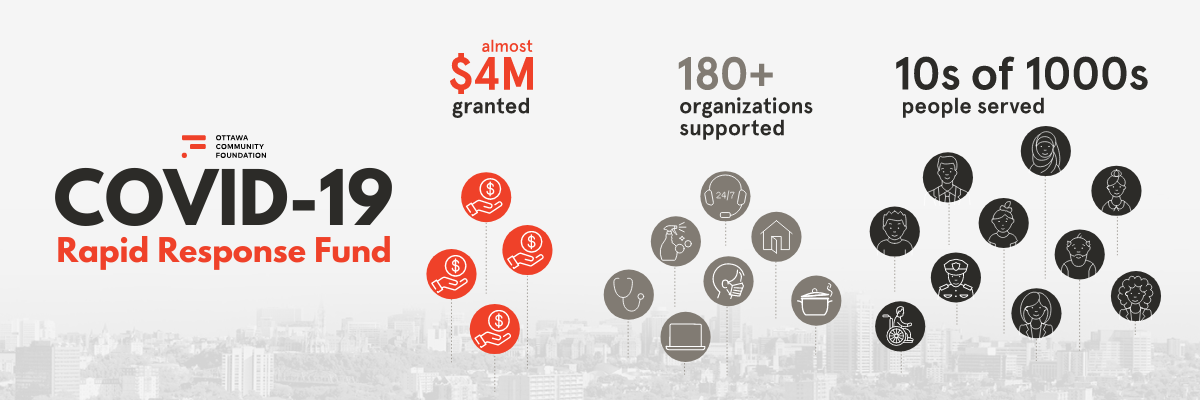Six years ago, I assumed the role of CEO at the Ottawa Community Foundation. Since then, my aim has remained consistent: create positive, systemic, sustainable change. Throughout the pandemic I have witnessed organizations doing exactly this, even without our direct involvement. I’m inspired by their desire to reimagine their role, scale their response, and deepen their impact. Perhaps the qualities I sought to imbue in our sector are more embedded in our DNA than I thought. I’m left with a powerful sense that we can go bigger, faster, and stronger than I’d previously hoped.
In this update, I want to do three things: first, give you an update on our Rapid Response Fund (RRF) and offer lessons learned, second, share OCF’s evolving role and our transition from response to recovery, and finally, inspire you to join us on the journey ahead.
The pandemic response provides a unique opportunity to accelerate structural change that holds the potential to address our city’s deep racial and economic inequalities. Though we can’t underestimate the challenges, together, I believe we can address them.
Response Update: COVID-19 Rapid Response Fund

When COVID-19 first hit, our role was to respond quickly. We launched the RRF to provide critical assistance to front line agencies serving those disproportionately affected by the pandemic. Thanks to the remarkable generosity of current and new donors, we were able to support a range of needs.
Later, we partnered with Community Foundations of Canada and the Government of Canada to deliver more funding locally through the Emergency Community Support Fund.
After 17 weeks, we just wrapped up our final round of granting.
What we’ve learned through the response
During the last four months we saw an unprecedented level of ingenuity in the way that local community organizations responded to evolving and deepening needs. I want to share a few inspiring examples of community innovation and resilience that many of you helped us support:
Advancing Racial Equity – Communities of colour were among those most affected by the pandemic.
To address evident health disparities, the Ottawa Local Immigration Partnership (OLIP) responded by collecting and organizing data to identify COVID-infection risks faced by newcomer and racialized populations. OLIP is looking to scale up and enhance data collection across organizations in order to influence policy and improve health outcomes for these segments of our community.
Supporting Mental Health – The pandemic added barriers to accessing mental health support when people needed them most.
Counselling Connect, a coalition of 13 mental health providers, responded by creating a centralized portal for children, youth, adults and families to make appointments for free, same-day phone or video sessions. Their work is paving the way for community health systems to deliver other services and specialized care digitally.
Strengthening Food Systems – Recent income losses and access constraints triggered significant food insecurity in Ottawa.
Parkdale Food Centre (PFC) responded by leveraging the surplus capacity of local restaurateurs and caterers to prepare and deliver fresh and frozen meals. PFC is now contributing to research on new approaches and relationships developed during the lockdown period to enhance the distribution of healthy food.
These examples and others give us hope for the road ahead and the ways in which private, public, and philanthropic partners can harness our joint creativity in service of a thoughtful recovery.
From Response to Recovery and Rebuild: OCF’s Role
OCF exists to serve our community. To me, this means driving positive socio-economic indicators to 100% and negative ones to zero.
COVID-19 has laid bare the fault lines in our social infrastructure for everyone to see. While racialized and marginalized Canadians have long known of these cracks, they weren’t obvious to those with power and privilege. Not any more. The numerous and wide-scale demonstrations after the horrific death of George Floyd illustrate that long-standing systemic injustices are not to be tolerated. We must act.
As I look towards OCF’s role in our recovery I know that philanthropy, on its own, isn’t enough. Across issue areas the cost of the challenges far outstrip the funds available. Even though last year was record-breaking for us in terms of the total amount we granted – $14M, it is clear that systemic solutions demand cross-sectoral commitment.
The promise of philanthropy however, and our promise to our community, is to be a key player in these strategic partnerships. As Ottawa’s foundation we will add our voice to those in the rest of our sector, along with the public and private sectors to collectively reimagine systems that have perpetuated inequity. No one group can lead the recovery alone. None have all the resources nor ideas, but together we do.
To facilitate this collaboration, we will convene cross-sectoral forums for community, business, and government leaders to define and drive shared action towards transformative change. The first such discussion will focus on investment and action to strengthen the community food system. We will send additional details in the coming weeks.
Join us
I invite you to join us in the next phase of this journey where together we can enable our city to reach its full potential. This is just a heads-up. We will be sharing more about how you can join us in the recovery, whether you are a donor, community organization, or a member of the public or private sectors.
Thank you,

Marco Pagani
President & CEO

